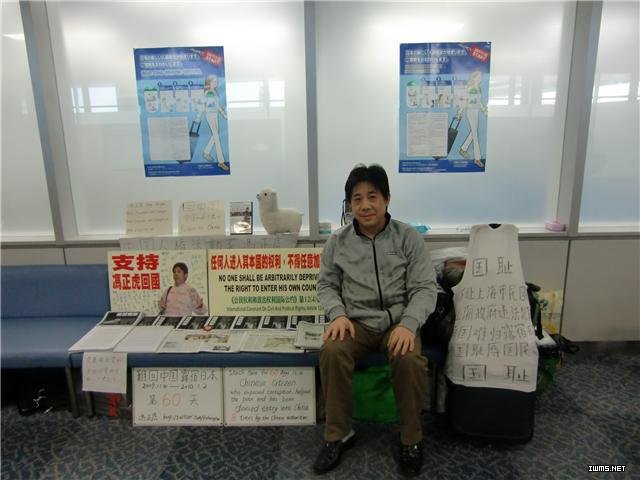After being denied re-entry to China eight times, Feng Zhenghu lived in Tokyo’s Narita Airport for 92 days in 2009-2010. Now Feng is telling the story of his airport odyssey on his blog, and CDT is translating his account. This is the fourth installment. Read Part 1, Part 2, and Part 3.
November 6
In three days, I had only eaten three onigiri, and now they were all gone. My younger sister, who lives in Japan, tried to send food, but it was refused at customs.
In the morning, I went to the person in charge of the Narita Airport immigration bureau, Mr. Suzuki. Appealing to his humanity, I asked to have an immigration staff member take me to buy a few onigiri. He refused. He went on that I need only enter Japan and I could buy whatever I liked in the terminal. His reasoning was imperious: there were no regulations allowing them to take me across the border to buy food. Japan is a country where the lower always obeys the higher. If high-level officials prohibited me from being taken to buy food, then no one would show me pity.
It was clear to me that the Japanese bureaucrats were not at all sympathetic. They were not just indifferent, but even a bit cruel. Perhaps being a friendly country was merely Prime Minister Hatoyama’s ideal. If you bureaucrats have a bit of a sense of sympathy and friendship, then please don’t hurt me any more when I’m in these dire straits. I would pay myself. Surely it isn’t against Japanese law for an immigration staff member to take me to buy a bite to eat? The Japanese government shouldn’t speak emptily of friendship. It ought to have at least a little bit of sympathy.
If these things happened in China, no one would treat a foreigner like this. While Chinese people tear each other apart, they are always polite to foreigners. At the very least they wouldn’t play these kinds of games with a foreigner in difficult circumstances. A discordant country that deceives foreigners—this is China’s destiny.
China is ever stronger, and the government has money and power. Officials use their power to bully people, but the people don’t have freedom or human rights. Even the right to go home can be suddenly taken away. Who would dare to offend such a country if it is heavy-fisted, and who would respect such a country if it is weak? Japan can’t defend a Chinese person’s human right to offend the Chinese government, and the newly elected Democratic administration, heeding the signal of the United States, needed China’s strength. Perhaps the humane act of a functionary taking me to buy food would displease Chinese officials.
Japan is a democratic country with the rule of law, and respects the universal value of human rights. The Chinese police ignored my wishes and savagely kidnapped me to Japan’s doorstep, while the Japanese police wouldn’t dare to drag me into their country without legal grounds. So it goes without saying that the Japanese government could only starve me into “voluntarily” crossing the border into Japan. Japanese officials look down on us Chinese. So many Chinese people are illegally detained or steal over the border to Japan. So many dissidents China has barred from returning home merely say a few words in protest, then obediently become political refugees in the democratic nations of the Europe or the U.S. Who would be unwilling to stay in a democratic country, and instead fight to return home and be tormented? Perhaps, they had concluded, I was just another annoying Chinese putting on a show.
“If you enter Japan, they have all kinds of food that you can buy for yourself.” This one gentle sentence from the Japanese official had in fact humiliated me: just go through the doggy door, and the outside world is all yours. In the airport in Japan, I wasn’t only protesting the Chinese government’s infringement on my human rights. I was a Chinese person, representing China’s image. I would give my life for my country. I would uphold the dignity of the Chinese people. I would let the world see a staunch, optimistic Chinese person defy brutal oppression.
Today I didn’t eat anything. I drank some cold water, moved little, and sat quietly with my eyes closed to save my energy. I had been in prison and refused food before. I would make my body endure a little bit longer. [Chinese]
Translation by Anne Henochowicz.








